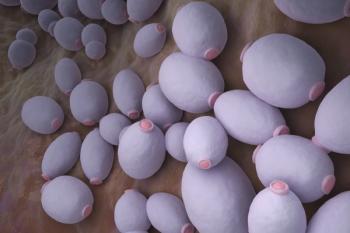
A study published in Frontiers in Immunology indicates that for the prognosis of recurrent vulvovaginal candidiasis (RVVC) and vulvovaginal candidiasis (VVC), the host-immune responses, particularly Th1/2 immunity, may play a vital role.


A study published in Frontiers in Immunology indicates that for the prognosis of recurrent vulvovaginal candidiasis (RVVC) and vulvovaginal candidiasis (VVC), the host-immune responses, particularly Th1/2 immunity, may play a vital role.

The compound may also provide a synergistic effect in combination with fluconazole.

Nkechi Azie, MD, MBA, FIDSA, vice president of clinical development and medical affairs at SCYNEXIS, discusses the potential FDA approval of ibrexafungerp (Brexafemme; SCYNEXIS) for the prevention of recurrent vulvovaginal candidiasis.

Correct terms and education can help normalize the conversation for patients.

If approved, ibrexafungerp would be the first and only approved therapy for both the treatment of vulvovaginal candidiasis (VVC) and the prevention of recurrent vulvovaginal candidiasis (RVVC).

Mycovia Pharmaceuticals recently announced US availability of oteseconazole capsules for the treatment of recurrent vulvovaginal candidiasis in women without reproductive potential.

The CANDLE open-label sub-study enrolled 24 patients with RVVC who failed to respond to fluconazole treatment, which was given as an initial 3-dose treatment over 7 days.

Aerobic vaginitis (AV) in pregnant Vietnamese women correlated with a higher risk of puerperal sepsis and negative pregnancy outcomes.

Eradicating vaginal biofilms involving Candida species requires synergistic combinations of antifungal drugs with pre-, pro-, post-, and synbiotics, according to a recent Frontiers in Microbiology review.1

A cocktail of different probiotic species may be more effective than probiotic monotherapies, according to a recent literature review.


Results from this study can help increase understanding of the estimated incidence and lifetime prevalence of VVC in the US.

Vaginal yeast infections were successfully treated with berberine, a biologically active herbal alkaloid, according to a study published in Frontiers in Pharmacology.

A study published in Frontiers in Cellular and Infection Microbiology observed significant vaginal microbiome alterations in patients with bacterial vaginosis (BV) plus vulvovaginal candidiasis (VVC) mixed vaginitis before and after drug treatment.

Currently approved for the treatment of vulvovaginal candidiasis (VVC), and if the sNDA is approved, ibrexafungerp (Brexafemme; Scynexis) would be the first and only oral non-azole medication for the prevention of recurrent VVC.

The research published in the Journal of Clinical Medicine found women were more likely to have infections in the summer.

In June 2021, ibrexafungerp (Brexafemme; Scynexis) became the first drug approved by the U.S. Food and Drug Administration (FDA) in a novel antifungal class in more than 20 years and is now available to treat vulvovaginal candidiasis (VVC).

The US Food and Drug Administration has approved oteseconazole (Vivjoa; Mycovia Pharmaceuticals) to reduce the incidence of recurrent vulvovaginal candidiasis.

Vulvovaginal candidiasis (VVC)—commonly known as a yeast infection—is a problem many women face at some point. About half of all women have had at least 1 of these infections clinical diagnosed, and between 6% and 10% are believed to develop a recurrent form of this condition with 3 to 4 or more episodes in a single year, according to a new report.

The VMB may be a biological barrier to pathogenic microorganisms. There is also an increased risk of acquiring various vaginal pathogens when the dominant lactobacilli community is disrupted.

Women with bacterial vaginosis (BV) and/or vulvovaginal candidiasis (VVC) were significantly less likely to use intimate soap and moist wipes after urination compared to healthy women without any vulvovaginal symptoms, according to a cross-sectional study published in the journal Revista Brasileira de Ginecologia e Obstetricia.

Not only does vulvodynia impact a woman’s sexual and psychological health, but it also places significant financial burden on those seeking treatment.

Using bactericidal soaps and sex toys and having anal sex were associated with higher rates of bacterial vaginosis (BV) and vulvovaginal candidiasis (VVC), according to a study in RBGO Gynecology and Obstetrics (Revista Brasileira de Ginecologia e Obstetricia). However, study authors caution, identifying these associations do not establish causality.

A study published in Women’s Health Reports suggests best practices for treating recurrent vulvovaginal candidiasis.

The incidences of vulvovaginal candidiasis (VVC) and bacterial vaginosis (BV) are especially high in young women, and women with a limited education and low-family income, according to a nationwide cohort study in the International Journal of Infectious Diseases.